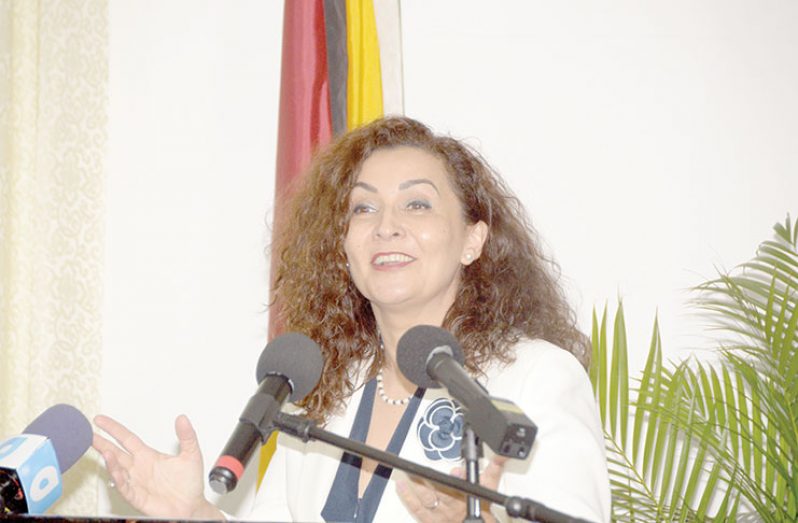“Internet for @ll”, a programme seeking to make web services more accessible for persons living with disabilities (PWDs), has been hailed as groundbreaking by Telecommunications Minister, Catharine Hughes.
“Guyana is running a fast marathon to bridge the gap in Internet accessibility while inculcating ITU international standards into every initiative,” the minister said, on Friday, at the launching of the programme at the Arthur Chung Convention Centre.
“Internet for @ll” targets particularly persons with visual and hearing impairment.
Hughes opined that for many years, not enough has been done to minimise the challenges faced by PWDs. However, when the Telecommunications Ministry was created in 2016, she shared that the body engaged PWDs.
“We were reminded that many PWDs, especially the visually and hearing impaired, do have the capacity and the will to contribute to national development in meaningful ways,” she said, adding that: “They want, and in fact demand, to be included in economic, social, political and cultural policies and programmes.”
In budget 2019, the ministry put together the first set of programmes for PWDs, Hughes reminded. Through these measures, PWDs would be able to purchase their own vehicles equipped with accessibility features, free of excise duty and Value Added Tax (VAT), and, specifically for visually and hearing impaired persons. Tax rebates on handsets with accessibility features were also granted.
“We believe that Information and Communication Technology (ICT) can have a far-reaching and positive impact in people’s lives based on the actions we take in our personal, professional and institutional capacities; we can all come together to create equal lives,” ITU Senior Programme Officer, Roxana Iliescu, said.
Nowadays, she reminded, ICT is present in every aspect of life but utilising the technology is not always an easy task for all. In fact, she stressed: “These technologies are not always available, accessible and affordable to all.”
DIGITAL INCLUSION
In this context, she noted that emphasis must be placed on fostering digital inclusion.
“Digital inclusion means the empowerment of people through ICT,” Iliescu said, adding: “It is the ability to persons to access ICTs.” And this is not just for PWDs, but for all persons, regardless of age, ethnicity, gender or otherwise.
In this specific context however, the aim is to create a more enabling environment so that PWDs can access online governmental information and services in Guyana without discrimination.
Due to increased access to information and the ability to do more, Roxana further highlighted that the programme would be able to contribute to the socio-economic empowerment of PWDs and contribute to wider national development.
With the implementation of the programme, she also noted that Guyana is set to be a role model for many other countries.
“We strongly believe that this web accessibility programme will be a landmark effort to support equal access and equal opportunities,” she said.
Ministerial Adviser to Minister Hughes, Lance Hinds, also shared that in Guyana, where the population is relatively small when compared to it its geographical size, it becomes imperative that every person contributes to development.
He shared that in making the society a more inclusive one, it is important that intangible infrastructure such as those for web accessibility is bolstered, alongside the more tangible components such as providing wheelchair ramps and communication aids.
The “Internet for @ll” Programme is in line with ITU Plenipotentiary Resolution 200 ‘Connect 2020 Agenda for Global Telecommunication/ICT Development’ and ITU Strategic Goal to ensure ICT is accessible to persons with disabilities.
The programme is focused on two fundamental aspects: national political buy-in and capacity building.
To garner the buy-in, the ITU will make a presentation on ICT accessibility focused on web accessibility to enable all policymakers to understand the power of accessible ICT in ensuring equal access to information products and services for all citizens. Through capacity building, the ITU will engage in training, which will include five days of in-country training, with the objective of creating in-country capabilities for developing digital content as well as for developing and designing accessible websites. This training will commence on Monday.




.png)









